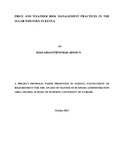| dc.description.abstract | The study sought to find out if price and weather risks management instruments are applied in the sugar industry sub sector in Kenya and if so, whether the instruments are effective. A guided questionnaire was used and face to face interview was also conducted. In some cases, telephone interview was administered to gather primary data. A response of 100% for primary data was achieved and the data was analyzed using descriptive statistics. The theory of futures markets, McKinnon (1967) portends that, instruments known as derivatives can be used to manage risks associated with commodity price fluctuations and adverse weather consequences. Indeed these instruments are used in other parts of the world such as America, Spain, and Canada with good degree of success. The study however, found that in Kenya and particularly in the sugar industry derivatives are not applied yet. Sugar and cane prices fluctuate so much that the farmers and millers sometimes incur big losses in the industry. The finding of the study was that even though derivatives are not used, alternative methods are available to farmers although they are not as effective. Weather Index Insurance (WII) which has been used in developed and some developing countries to manage the risks associated with adverse weather is also not applied in the industry. According to the findings of the study weather risks management needs the involvement of the government for it to work effectively since there is huge financial cost which the farmers are unable to bear. Insurance companies, the government and the farmers need to team together to make weather risks management tools such as WII work. Insurance companies currently offer fire insurance policies to cane farmers but this has not been embraced well due to high cost associated with such premiums. It was found out that sugar cane farmers have resorted to ineffective alternative ways to reduce price and weather related risks. The researcher recommends that the government through the Ministry of Agriculture, Livestock and Fisheries should incorporate some of the risks management instruments like WII and irrigation in their strategic policy formulation to assist the sugarcane farmers to address the perennial problems associated with drought and floods. Left to the farmers alone, the industry will be unattractive employer in the country as growth will not be guaranteed. | en |

